The 5thChina Investments Annual Conference and Seminar of Discipline Construction of Investment was solemnly held by Zhongnan University of Economics and Law (ZUEL) from 13 October, 2017 to 14 October. Invited CUFE guests include Professor Wang Qiyao, President of CUFE, Vice President of the Investment Association of China(IAC) and Chairman of Investment Discipline Construction Committee of IAC, Dean of MS&E Professor Li Wenbin, Professor Li Yongzhuang from CUFE Asset Management Corporation, Associate Deans of MS&E Professor Liu Zhidong and Associate Professor Chen Junhua, Director of Department of Project Management Associate Professor Song Yanqiu, Dr. Qu Hongyan and Dr. Jing Zhongbo from Department of Investment, as well as some doctoral and graduate students. They had keynote speeches at the conference and had topic discussions and exchanges.

Caption: A group photo of CUFE teachers and students attending the conference
Sponsored byInvestment Discipline Construction Committee of IAC and Committee of China Investment Discipline, the conference this year was held by School of Finance, ZUEL and China Research Institute for Investment of ZUEL, under the joint assistance of CUFE, Shanghai University of Finance and Economics, Southwestern University of Finance and Economics, Dongbei University of Finance and Economics(DUFE),University of International Business and Economics, Higher Education Press and Shanghai Zeji Education Corporation. As is never as splendid as this time in history, more than 230 representatives attended the conference, who are mainly experts, scholars and graduates from over 70 prestigious universities and organizations including Renmin University of China, Fudan University, Wuhan University, Huazhong University of Science and Technology, Sun Yat-sen University, Zhongnan University of Economics and Law, Shanghai University of Finance and Economics, Southwestern University of Finance and Economics, Dongbei University of Finance and Economics, Wuhan University of Technology, CUFE, IAC, Higher Education Press, China Machine Press and Peking University Press. The general council meeting of the annual conference was held as planned between 20:00 p.m. to 21:30 p.m. on 13 October. At the meeting, ZEUL gave reports on conditions of preparing and organizing the annual conference, and DUFE gave reports on plans and preparation for the 6thChina Investments Annual Conference. Also, council members reviewed the applications of Shanghai University of International Business and Economics and Shanghai Lixin University of Accounting and Finance, two newly-jointed members. The members had discussions with regards to deciding on the host of the 6thannual conference, standards for the qualities of investment as a discipline, academic exchanges of young teachers and training of senior investment management talents. In the end, Professor Wang Qiyao analyzed problems facing teaching, researching and talent training of investment in China and proposed the focus of future effort. The council meeting was hosted by Professor Li Wenbin, Dean of MS&E and Secretary General of Investment Discipline Construction Committee of IAC.
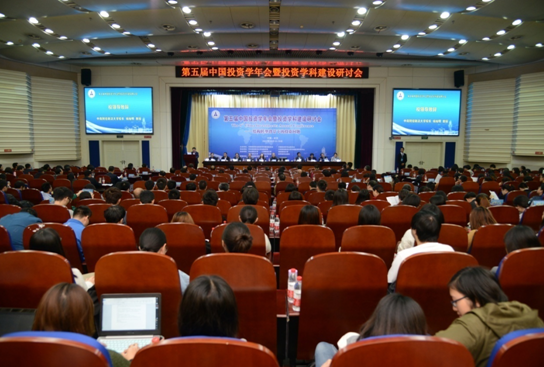
Caption: the 5thChina Investments Annual Conference
On behalf of the hosting university, Professor Yang Canming, President of ZUEL addressed the conference at the opening ceremony on the morning of 14 October. He elaborately introduced the construction condition of ZUEL, especially that of School of Finance. He also extended his wishes that experts of fellow universities could leverage the platform provided by the conference to probe into some hot issues of investment like Belt & Road Initiative and excess capacity transfer, balance development of regional economy as well as entrepreneurial investments and high tech industries, which will help promote huger and more stable development of the discipline to step into a new stage.

Caption: Professor Yang Canming addressing the conference
There were 8 guest professors invited to have keynote speeches. The first session was composed of panels by Mr. Yang Qingwei, President of IAC and former Deputy General Manager of China Investment Corporation, Professor Wang Qiyao, President of CUFE, Vice President of the Investment Association of China(IAC) and Chairman of Investment Discipline Construction Committee of IAC, and Professor Zhang Zhonghua from School of Finance, ZUEL. They mainly talked about talent training, discipline construction and development of investment and other topics.
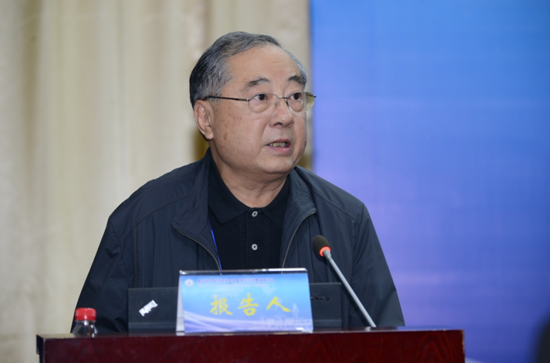
Caption: Mr. Yang Qingwei, President of IAC
Titling “Strengthening Discipline Construction of Investment and Holding the Annual Conference Successfully”, the speech given by Mr. Yang Qingwei won warm applauses. He believed the focus of the conference this year conforms accurately to the current economic situation. Meanwhile, he confirmed the positive contributions to promoting the discipline construction and development IAC has made since founded. Lastly, he gave four suggestions for the future working framework.
First, strengthen the connection with authorities’ concerned, especially with government authorities of investment and educational departments, in order to seize productive external surroundings and institutional environment for the construction and development of the discipline.
Second, exchange more on the construction issues. Events like discipline construction seminars, report meetings of research results, fairs for educational achievement sharing and regular training workshops for teachers and curriculum designing can be promoted. By doing this, we strive to improve the talent training quality and academic research level, make progress in construction of discipline faculty and promote teaching and research cooperation between the council and member organizations.
Third, keep on holding the annual conference, trying to forge it into a learning and academic exchange platform that matches China’s economic competence and enjoys international influence and reputation. This platform will help strengthen the academic skills of domestic investment researches and enhance China’s global status in the field of investment.
Fourth, attach importance to investment consultative services, strengthen communications with investment organizations and the industry, and improve integration of production, study and research. Council members need to identify existing problems in the domestic investment and economic operation, then provide consultative services for government authorities concerned, offering advice for the sustainable and healthy development of investment and economic operation. Besides, they should also develop, along with other departments of the association, functions that serve as a transitional role in the society and actively take part in important individual, policy or strategic researches proposed or authorized by National Development and Reform Commission with the State Council and other government authorities, social groups or investment and financing organizations. In sum, that is to provide consultative advice for major projects and relevant policies, give full play to IAC’s intelligent, talent and platform resource, and therefore devote our efforts and contributions to the country’s economic construction and deepening reform of investment and financing.
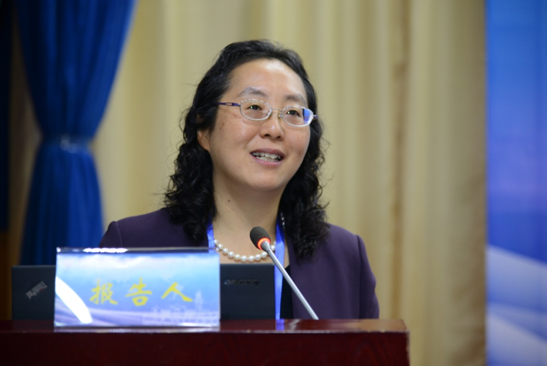
Caption: Professor Wang Qiyao, President of CUFE, Vice President of IAC
Following Professor Yang, Professor Wang Qiyao addressed the conference with the speech title, “Investment and the Discipline of Investment in the Innovative Time”. She mainly focused on three aspects as follows.
First, how to view the role investment is playing in economic development. She believed investment is the major engine to drive economic growth and influences the direction of economic development significantly. Investments are the promoting leading force for huge achievements in the last over 30 years of reform and opening-up. While investments have been bringing enormous benefits to the economic growth, improper investments are causing negative influence to distort the economic structure. As scholars, while comprehensively and correctly aware of the achievements investments bring us, we also need to analyze the existing problems to guide the future direction of the economy.
Second, how to properly tackle the problems existing in the economic development during this economic restructuring period. Professor Wang holds that the economy in the past 30 years isfeatured with extensive development and this era has passed. In the crucial period shifting between the old times and new ones, we should on one hand deliberate over issues and properly deal with imbalances of industrial structure caused by previous improper investments. On the other hand, we need to actively explore and identify perspective investment sectors and regions. In a nutshell, we should be open to the future, research deep into investment theories and technology, enhance the ability to familiarize and foresee social and economic conditions, and pioneer possibilities and development directions of scientific technology and social, economic status.
Third, how to accurately identify the goals of talent training of the discipline. She pointed out that although universities have different characteristics in talent training, three perspectives could be considered to evaluate the goal system of talent training in investment under the new times background. The first perspective of the goals is to ensure that students well master basic investment theoretical and technological knowledge and are qualified for engaging in relevant workforce. Second perspective stresses that, after they’ve gained required knowledge and their career has entered a mature stage, they could independently conduct investment analyses or operations. The last perspective for talents is that they are capable of expanding new investment sectors and regions prospectively, discovering new products, new industries, and developing new investment layout, especially in a global angle. Furthermore, they would possibly be responsible for shouldering the mission of reviving the nation by developing investment layouts for businesses and even for the country’s strategies, which is the top mission of talent training.
In the end of her speech, she concluded that discipline construction of investment in the new era should not be restricted to existing discipline boundaries. Crossing and integration of disciplines should be encouraged. Students should carry out theoretical and practical projects openly and cooperatively and teachers are supposed to extensively unfold multiple activities of scientific research and teaching method exploration, in whose joint efforts the discipline construction will be pushed to a higher level.
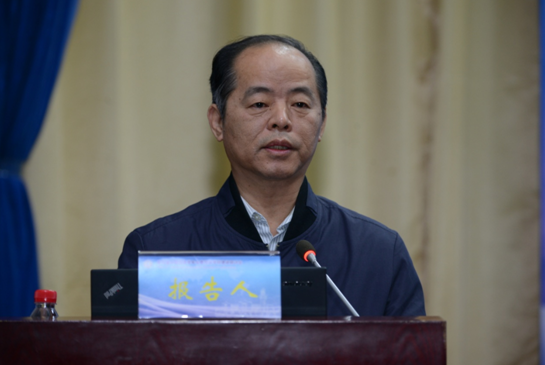
Caption: Professor Zhang Zhonghua from School of Finance, ZUEL
The title of Professor Zhang Zhonghua’s speech is “Restructuring, Upgrading and Investment Discipline Development”. He mainly talked about three issues.
First, it is necessary to attach importance to the discipline development in economic restructuring and upgrading. Professor Zhang believes that the fundamental mission of a university is to cultivate talents. Therefore, major and curriculum settings should also adjust as the social needs changes. Dating from 1950s, the discipline of investment in China has been through a difficult time but survived. What saved it is its compliance to social needs. The investment growth has been speeding down in recent years. This is caused by systematical cost, but it does not mean that the social need for investment talents is shrinking. On one hand, from the long-term perspective of physical economy, the adjustment and optimization of investment is indispensable if restructuring and upgrading of physical economy is to be realized either driven by the supply or demand. It does not implicate a decrease of need for the discipline talents, but a change in the need structure and talent quality requirement. On the other hand, as China’s financial status is rising and the financial structure is in a significant change, there are still huge potential to tap in its development. China has entered the times of greater asset management, also known as a time of greater investment. Thus, there is huge need for investment professionals to engage in the management of residents’ wealth.
Second, the goals of talent training in investment should be clearly identified. Professor Zhang believes that investment is a complicated discipline, and thus it should take it as goals training all-rounded, innovative and open-end talents. Investment major students need to know not only financial investment but also physical investment. They should also be familiar with public finance, macro-economic operation, engineering and projecting as well as corporate operation. Furthermore, qualified students are not only equipped with professional knowledge, but also capable of innovating with creative spirit and thinking mode. In addition, they are encouraged to focus on both domestic and worldwide perspectives.
Third, the talent training should be in line with the scientific outlook of development. There will be differences between goal settings and training plans in different universities. Students will be given more opportunities to make their own choices. And new corporation pattern between universities and businesses can be built based on the differences.
The second session of the conference consisted of academic reports, which was hosted by Professor Li Wenbin. The reporters included Vice President of DUFE Professor Wang Weiguo, Cheung Kong Scholar Program Member Professor Wang Changyun from School of Finance, RUC, Doctoral Supervisor Professor Zhang Luyang from School of Economics, Fudan University, Dean of Department of Investment Professor Chen Jie from SUFE.

Caption: Professor Wang Weiguo, Vice President of DUFE
Professor Wang Weiguo’s report title is “the Innovative Competence and Regional Economic Growth in Northeast China”. Surrounding this topic, he first proposed a new index system for comprehensive evaluation of innovative competence and detailedly illustrated the influence of innovative competence on economic growth. He believed it is crucial to transform the region’s production factor driven and investment driven economy into an innovation driven one as soon as possible so that the economy develops healthily and the economic structure gets optimized and upgraded. Lastly, he expressed huge expectation and confidence to DUFE as the host of the 6thannual conference. His confidence came from three aspects: IAC leaders’ strong support, experience accumulated in previous conferences and DUFE’s strong competence and determination in the discipline.
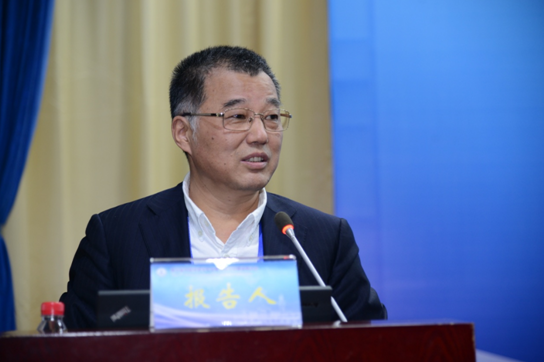
Caption: Professor Zhang Luyang from School of Economics, Fudan University
Following that, Professor Zhang Luyang gave his report as “Innovation, Entrepreneurship and Venture”. The report consists of two parts. In the first part, he proposed that the four major dimensions to view innovation are high-tech based innovation, entrepreneurship and patented inventions, employment-based innovation and entrepreneurship as well as high-end national technological products. He then elaborated on the four dimensions distinguishing between innovation and entrepreneurship. As he stressed, innovation means to develop new products and technologies based on the existence of a company, whereas entrepreneurship is defined as how to survive by technological ideas without a pre-existing company. Afterwards, the professor vividly demonstrated how to understand venture and its operation. And he emphasized that a tech-innovative company need to be qualified for technological innovative competence, advanced business model with expanding competence, corporate governance construction with execution ability and the ability to use social capital and gain government support. Finally, he added the number of patent applications of Chinese companies ranks the largest in the world. What needed to be done next ismaking good use of financial capital to apply in knowledge capitaland lower the production cost by better transforming between the two.
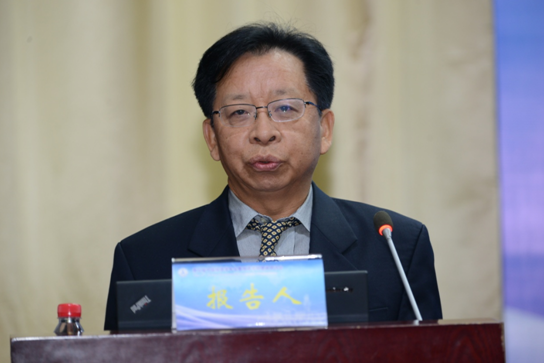
Caption: Professor Wang Changyun from School of Finance, RUC, Cheung Kong Scholar Program Member
Professor Wang Changyun was the next to address. His speech title is “The Deposition Effect Shown in Chinese Individual Investors --- Analysis of a Stock Account Valued at 3.36 Million RMB”. The report can be divided into three parts: the big data based analysis of characteristics and transaction behaviors of investors and investment performance, interpretation of deposition effect, as well as the relationship between the investors’ emotions and the effect. The third part of his speech brought something new in the academic field. He gave two arguments: First, it can be discovered in the results of statistical analysis and analysis of deposition effect that the characteristics of investors have an influence on deposition effect. Specifically, an investor’ experience and the market value of his account are in negative correlation with deposition effect. That’s to say, the more advanced the education is in the region where his account is registered, the more experienced the person is, the less effective deposition effect works. Second, in China, the individual investor group is taken up mainly by young or middle-aged people in the central area; the deposition effect displayed on male investors is shown to be higher than that on female ones; and individual investors with investment under 100,000 RMB takes up 80% of the total investors. The deposition effect is displayed significantly on Chinese individual investors, which shows more obviously in bull market than in bear market. The whole speech was lively and attractive, which provoked thoughts of scholars and experts present.

Caption: Dean of Department of Investment Professor Chen Jie from School of Public Economics and Management, SUFE.
Lastly, the title of Professor Chen Jie’s report is “Analysis of the Status Quo and Future of Real Estate Investment in China”. He analyzed the status quo and future of real estate investment in China from three perspectives of the real estate market in China (namely, financing structure, credit supply and spatial linkage). The result of his analysis showed that real estate investment is still need oriented. But in China, population inflow is imbalanced --- land supply cannot catch up in regions where population flow in heavily. In the context of nationwide de-inventory strategy, Yangtze River Delta Region, Pearl River Delta Region and cities like Beijing and Tianjin are however still in need of inventory so as to adjust the structural imbalance between demand and supply of domestic real estate market. In the end, he stressed that the real estate market has entered a crucial turning point with more opportunities. He hoped he could make more contributions to it and seize opportunities to better the market.
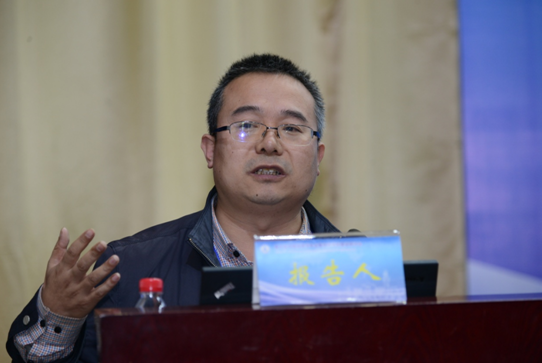
Caption: Mr. Duan Huiqing, Senior Editor from icourses.cn
In addition to other speakers in the keynote speech session, Mr. Duan Huiqing, Senior Editor from icourses.cn had s report speech titled “Domestic Investment Discipline Construction on MOOC and Online Operation Condition”. He reported in detail the competence and working construction of icourses.cn. The online platform is jointly funded by Ministry of Education and Ministry of Finance during the 2nd Five-Year Plan. After years of development, it formed rather huge scale with various high-quality finance courses. At present, investment courses are open online and attracted large amounts of learners to register. He added that he hoped to cooperate with more university teachers to improve the online platform. Finally, Professor Wang Zhiqiang, Dean of School of Finance, ZEUL and doctoral supervisor addressed the conference on behalf of ZEUL as the next host university. He congratulated the successful holding of the 5th annual conference, expressed his confidence about organizing the conference next year and extended sincere invitation to guests present.

Caption: Professor Tang Wenjin, Dean of School of Finance, ZUEL, hosting the opening ceremony

Caption: Professor Li Wenbin, Dean of MS&E hosting the academic report session
On the afternoon of 14th, group discussion session was held. It is reported that the annual conference received 106 academic papers in total including 64 teacher papers and 42 graduate papers. After the consensus group reviewed the papers anonymously, 73 papers were selected to have further discussion. These papers covered such topics as real estate development and investment, capital market development and investment, technological financial innovation and economic restructuring and upgrading, new-type urbanization construction, as well as entrepreneurship, innovation and investment discipline construction. With such great academic atmosphere, scholars and experts had extensive discussions and exchanges on the papers reported in this session. They provided multiple and original solutions and analyzing perspectives, in the context of economic new normal, for hot investment issues such as the role regional economic development plays in promoting industrial restructuring.
33 excellent papers were awarded by experts from the council. Among them, there were 3 teacher papers that won the first prize, 5 with the second prize and 10 with third prize; there were also 3 graduate papers with the first prize, 5 with the second prize and 7 with the third prize. Professor Li Jianhua, Deputy Dean of School of Finance, ZUEL, hosted the awarding ceremony.
Lastly, Professor Tang Wenjin, Dean of School of Finance, ZUEL, gave a summary and closing speech. He extended sincere thanks and hopes to the scholars and experts who presented great ideas in the conference and looked forward to the next conference.
It is reported that the China Investments Annual Conference is a nationwide academic conference that is sponsored by Investment Discipline Construction Committee of IAC and Committee of China Investment Discipline. The 5th annual conference, which received plenty of excellent academic paper on investment by admirable experts and scholars from universities across the country, is indeed a successful one, and the quantity and quality of papers this year advanced a new high in record. The conference did not only provide a platform for scholars and experts to exchange ideas, but also confirm a path in line with the development trend of the times and lay a solid foundation for the discipline development and construction in China, which is of milestone significance.
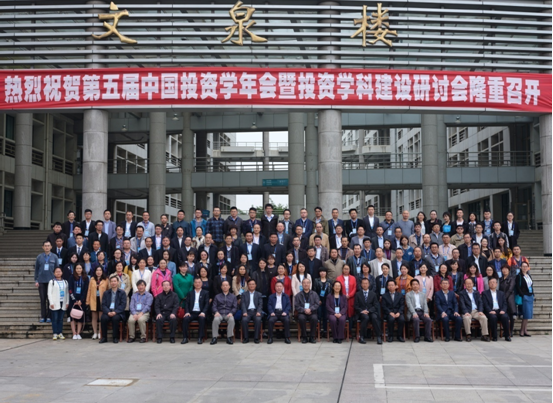
Caption: A group photo of guests present at the conference



